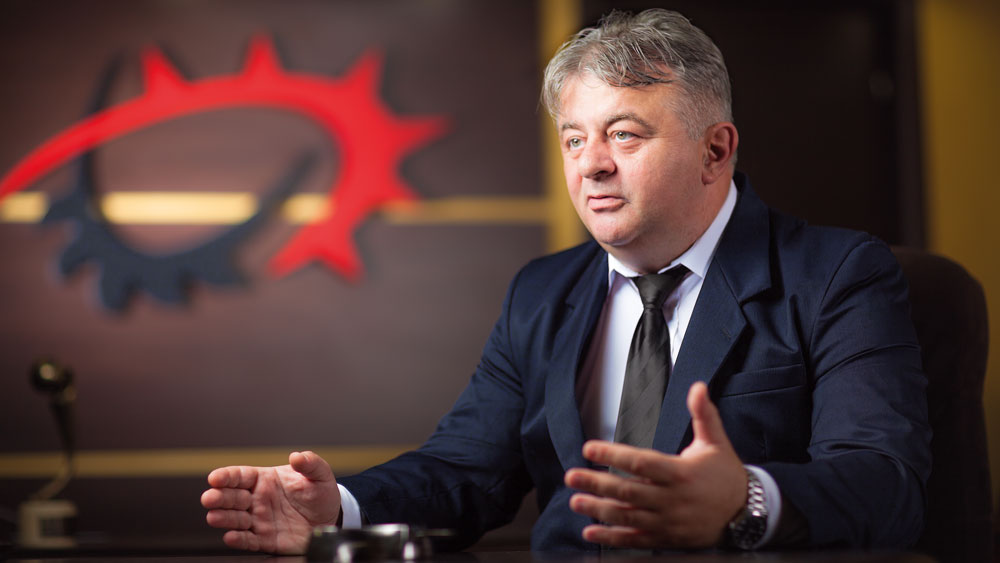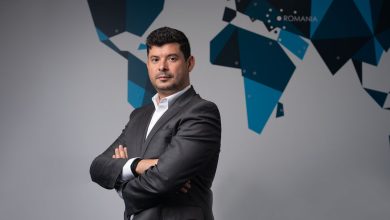Solution for the coal industry: Investments for sustainable development
Complexul Energetic Oltenia, one of the most important players in the energy services sector in Romania, can ensure over 30% of the electricity consumption in the national energy system. We are talking with the President of Directorate & General Executive Manager Sorin Boza about the situation of mining in Romania, European prospects in the field, energy efficiency programs, development of clean technologies and projects for the future.
Dear Mr. Sorin Boza, for the beginning, a brief introduction to your professional career… What were the main steps on the road to development towards the position of General Executive Manager of Oltenia Energy Complex?
Sorin Boza: I graduated from the Petroleum-Gas University in 1995, with a Master’s Degree in the field of Mechanical and Electrical Engineering and, later, a series of management courses within universities in Paris, Virginia-USA, Shanghai.
During 2005-2016 I held managing positions within the Lafarge Group (in Romania and in the Republic of Moldova) and within the Imerys Group France, and since December 2016 I have been the President of Directorate of Complexul Energetic Oltenia – Romania.
For the results obtained by Complexul Energetic Oltenia, as well as by the previous institutions within which I carried out my activity, I obtained appreciations such as:
- The special distinction ‘THINK BIG’ of Business Magazin and Forbes Magazine, granted by an independent jury;
- Designated one of the best 100 managers in Romania for achievements in the industry in 2010 and 2012;
- The distinction ‘MANAGER OF THE YEAR 2010’ within the Lafarge Group;
- Designated member of the working group in Romania for the reduction of CO2 emissions;
- Awarded for ‘PROFESSIONAL MANAGEMENT’ of Complexul Energetic Oltenia, within the Gala of the European Decade of the Centenary of Romania, in 2017;
- Received the ‘EXCELLENCE AWAD’ granted to the management of the company for contribution to the safe operation of the national energy system, in 2018;
- Designated the ‘MANAGER OF THE YEAR IN ENERGY’ within the 2018 Romanian Energy Awards Gala.
According to company’s presentation, Complexul Energetic Oltenia has been guaranteeing for 40 years the safety of the National Energy System and can still supply energy to Romania for other 40 years from now on only with reserves discovered so far. What is the current situation of mining in Romania and what are the prospects for the future?
Sorin Boza: Many want to eliminate coal-fired energy and replace it with renewable energy, but we should take into account that Complexul Energetic Oltenia today produces clean energy following environmental investments for which it has spent approximately EUR 1bn.
Throwing unreal statements into the public space in order to abolish coal-fired energy is a constant action of environmental organizations. They have repeatedly supported the idea that emissions from coal burning adversely affect the health of population, knowingly ignoring the existence of high performance electrofilters, installations for flue gas desulphurization and for dense slurry evacuation of ash and slag resulting from the combustion process – investments due to which environmental impact falls within the limits currently imposed by European directives.
Investments for sustainable development represent the solution for the coal industry, as, for Romania, it is well known that coal-fired energy is, every year, the main pillar for the safety of the National Energy System.
From losses recorded in the previous years, you ended 2017 with profit. Moreover, at the end of last year the Energy Minister named Complexul Energetic Oltenia ‘The energy champion of Romania’. How did you manage to reach this performance and what are your estimates for this year?
Sorin Boza: The gross profit for 2017 was RON 276mln, respectively a net profit of approximately RON 181mln was recorded, compared to losses of approximately RON 140mln posted in 2016.
The financial indicators’ values were achieved in conditions in which, in 2017:
- The unitary production cost per MWh fell by 2.24% and the cost per ton of lignite decreased by 7.2% vs. 2016;
- The company reimbursed to banks instalments, interests and commissions for loans contracted in order to comply with the European Directives on environment, worth RON 225mln, by 23% more than in 2016;
- The degree of realization of investments was around 80%, compared to the previous years when it reached 30-35%;
- 2017 was the first year when Complexul Energetic Oltenia had every month the Tax Clearance Certificate 0, i.e. no debts to state budget.
The activity carried out in 2017 allowed the reclassification of Complexul Energetic Oltenia among profitable companies and it ranked the 94th in the catalogue Top 100 the most valuable companies in Romania, edited annually by Ziarul Financiar.
Estimates for this year are optimistic, given that the first six months were also ended with profit.
You are the Vice-President of the Euracoal Association (The voice of coal in Europe). What is the situation in Europe? What are the challenges the industry is currently facing and what measures are looming to support transition to an economy with low carbon dioxide emissions, in accordance with Energy Union’s strategy? What estimative costs does this transition process involve for Complexul Energetic Oltenia?
Sorin Boza: The current European guidelines in the energy field list coal-based energy as the main responsible for global warming.
Although there are a number of studies showing that emissions of greenhouse gases in Europe reach only 10% at global level, Complexul Energetic Oltenia is strongly disadvantaged by the current legislation resulting from the ‘decarbonization’ trend.
The European Union has set for 2030 an ambitious target of reduction of CO2 emissions by at least 40% compared to 1990. This target must be achieved gradually, by 2030.
The platform for carboniferous regions in transition is meant to support Member States in their efforts to maintain economic growth and jobs in these affected communities. For this purpose, national working teams have been established in Germany, Slovakia, Poland, Greece and Romania, which include representatives of Complexul Energetic Oltenia.
The future of coal-based energy in Romania depends on the national energy strategy relative to constraints imposed by the European legislation, but while considering that its obligation is to maintain the electricity supply safety.
Romania cannot afford to diminish or give up the production capacity of Complexul Energetic Oltenia without considering an acute risk and a crisis of energy supplied.
EU’s targets for 2030 and the new EU Directive on ETS support the development of CCS technologies for carbon capture and storage at industrial scale.
Introduction of the CCS technology, considered essential for achieving national and European objectives of reducing CO2 emissions, ensures the maintenance of fossil fuels and mining plants, which will have a positive economic and social impact for Romania, while contributing to the energy security of the country. Support granted from European funds would contribute to the quick development of CCS at EU level.
Romania’s commitment on transition to an economy with low emissions of greenhouse gases does not involve stopping coal-fired energy generation at this point.
Applying the SWOT analysis on the business you are running, what are the strengths and threats highlighted?
Sorin Boza: Complexul Energetic Oltenia has obvious strengths, known by everyone, even if they are not recognized by environmental organizations, in particular. I would name them as follows:
- ENERGY SAFETY
- Complexul Energetic Oltenia ensures safety in supply to consumers, as the production process does not depend on atmospheric factors.
- SUSTAINABLE DEVELOPMENT
- The capacities of Complexul Energetic Oltenia have an increased energy efficiency through the programs for the rehabilitation of groups, and a reduced negative impact on the environment, through the projects implemented.
- MARKET SHARE
- Complexul Energetic Oltenia is one of the most important players in the energy services sector in Romania, being able to ensure 30% of electricity consumption in the National Power System and covers over 95% of Romania’s lignite production.
- Complexul Energetic Oltenia is a major producer at regional and European level.
- POSITIVE SOCIAL IMPACT
- Complexul Energetic Oltenia ensures jobs for around 13,000 employees directly and for 130,000 employees indirectly and contributes substantially to the environmental fund and state budget.
Definitely there are also threats of the unfavourable external environment, resulting from the current decarbonization trends or the current organization of energy producers in Romania depending on energy production sources, unique in the world.
As known, in July 2017 the European Commission published BAT Decision on the best available techniques for large combustion plants, under which it established very strict limit values for NOx, SO2 and particulate matter emissions.
The process of implementation by 17 August 2021 of new installations that comply with these limits, from all points of view (conclusion of contracts, mounting, commissioning), will have a major impact on ensuring electricity to the National Power System, by making unavailable during 2019-2021 of an installed power between 1,800 MW and 2,600 MW.
According to our analyses, in order to avoid endangering the safety of the National Power System, it is imperative that the 2021 deadline be delayed to 2024.
There are also certain provisions of the Romanian legislation that are detrimental for coal-fired producers as compared to other producers, by charging a number of additional taxes. For example, although the law establishing the promotion system for energy from renewable sources mentions that producers are exempt from the payment of green certificates corresponding to energy used in own technological consumption, ANRE does not consider that energy used by Complexul Energetic Oltenia to exploit coal represents own technological consumption.
Large energy consumers in Romania, except for Complexul Energetic Oltenia, were exempt from the acquisition of a considerable amount of green certificates, and Complexul Energetic Oltenia is the third largest energy consumer in Romania, after Alro Slatina and ArcelorMittal Galati.
Thus, Complexul Energetic Oltenia supports part of the costs necessary to enter in the competitive market, with minimum prices, of green energy.
Since 1998 to date, more than 500 mines have been closed in Romania, while some of the deposits have not been fully exploited. The solutions include the development of clean technologies for both extraction and capitalization of coal deposits, energy efficiency programs. What are the concerns of Complexul Energetic Oltenia in this regard? Are there plans to upgrade the existing capacities?
Sorin Boza: Complexul Energetic Oltenia has a program for the upgrade of mining equipment (excavators, graders and high capacity conveyors) for the period 2018-2030. Through this program it is aimed at modernizing at least two technological flows per year. The total value of the mining equipment modernization program is approximately RON 950,000.
Also, major investments are in progress to rehabilitate one energy group for each of the energy branches of Complexul Energetic Oltenia.
The procedure to implement denoxing plants at three energy groups was started, according to compliance deadlines.
At the same time, works are being executed to arrange the new coal deposit in Rosia, which will comply with all environmental requirements.
Regarding clean technologies, it should be mentioned about Complexul Energetic Oltenia that it is the only producer that owns flue-gas desulphurization plants and installations for dense slurry evacuation of ash and slag resulting from the combustion process, at all the component energy groups.
What is the status of negotiations with Chinese investors for building a new energy group in Rovinari?
Sorin Boza: Complexul Energetic Oltenia is entirely open to this collaboration.
The latest negotiations carried out with Chinese investors focused on coal price and costs involved by purchasing CO2 allowances.
The new European environmental standards, namely the reduction of carbon dioxide emissions to 550 grams/kWh, would mean the closure of all mines in Romania. How will this problem be solved? What are the technical solutions available? What measures will be taken at European level? What will Germany do for example, as the largest lignite producer in Europe, or Poland?
Sorin Boza: The performance standard of 550 grams of CO2/kWh you refer to has a provision included in the legislative package ‘Clean Energy for all Europeans’, launched by the European Commission in 2016.
The Commission’s proposal is to establish this standard as criterion for the participation of electricity production installations to capacity mechanisms (markets for technological system services). This threshold will apply to existing installations 5 years after the entry into force of the Regulation, and to new installations immediately after its entry into force.
It should be noted that the provision addresses only to capacity markets. In order to producer and sell electricity currently this standard does not apply. Thus, if the provision is approved in the form proposed by the European Commission, coal-fired power plants will be affected only in terms of access to these capacity markets.
Currently, the proposal for amendment is in the stage of three-party negotiation – the European Commission – the European Parliament – the EU Council.
In a document of the complex the new deadline mentioned for the completion of the privatization process is 19 June 2019. Will this process be resumed, will this date be observed?
Sorin Boza: It is one of our objectives. It remains to be seen… In order to be listed on the stock exchange, the company must register profit for 3 consecutive years. We hope the path started in 2017 will continue in a positive manner.
What priority projects and investment programs does Complexul Energetic Oltenia have in mind for the following period? Do you also intend to expand regionally?
Sorin Boza: For 2018, investment programs worth a total of over RON 800mln have been prepared – a value higher than that allocated in 2017.
The company has carried out investment projects to comply with the environmental conditions imposed, as well as to extend the lifespan and increase efficiency and reliability of the existing production capacities.
Following these investments, Complexul Energetic Oltenia can currently produce safe, performing, clean and relatively cheap energy, the production cost being below the average of the national energy system.
Besides the technological investments made or in progress, Complexul Energetic Oltenia allocates important amounts to restore land affected by mining exploitation to its former condition as forest and agricultural land (around 720 hectares were restored, and other 800 hectares are in the process of restoration), as well as to mitigate social problems determined by carrying out the mining exploitation activity (for example, works have been executed to supply water to nine localities, works to arrange two village settlements, as well as to repair roads affected by mining works).
Romania has the potential to become a major energy centre in the region (in the South-East of Europe) and it can be a net electricity exporter, if the current form of organization of producers (of single-source type), unique in the world, is given up.







